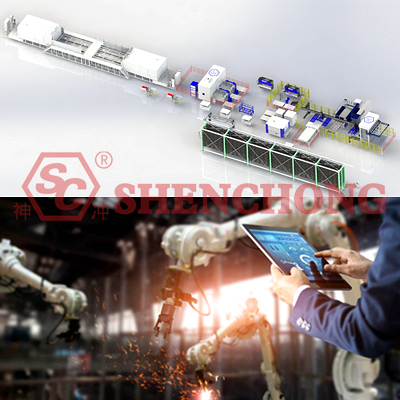
In the field of manufacturing, sheet metal automated production has become an indispensable part of modern production processes. Its success is not only attributed to advanced machines and equipment, but more importantly, it requires a solid IT infrastructure and a comprehensive network system to ensure smooth data transmission, secure storage, and intelligent processing.

As an important component of IT infrastructure, full coverage network plays a crucial role in sheet metal automation production.
It is like a huge "spider web" that tightly connects every device and sensor in production, ensuring real-time transmission and efficient interaction of information.
Whether it is the production workshop or sheet metal storage system, whether it is the sensors on the conveyor belt or the control units on the robot arm, they can be seamlessly connected to this network. It enables coordination and communication among all elements on the production line, thereby improving production efficiency.
In the automated production of sheet metal, electricity is an indispensable element. And intelligent weak current engineering is a system responsible for managing and monitoring power supply. It ensures stable power supply and communication for equipment and systems, injecting a continuous stream of power into the production line.
In this process, the management of electricity and signals is intelligently integrated, enabling robots, sensors, and sheet metal automation control systems to operate continuously and stably. At the same time, weak current engineering also includes cable wiring and signal transmission, which enables seamless data transmission between devices, providing guarantee for the stable operation of the production line.

In IT infrastructure, networks and servers are the core components. They not only provide intelligent support for sheet metal automated production lines, but also undertake significant tasks of data storage and processing. The server communicates with various devices and sensors through complex network systems, enabling real-time data collection, analysis, and decision-making.
In addition, through cloud computing and edge computing technology, IT infrastructure also provides great flexibility and scalability. This allows enterprises to increase or decrease computing resources as needed to meet the needs of production lines. At the same time, the high availability and disaster tolerance of networks and servers are also the cornerstone of the stable operation of the entire IT infrastructure, providing strong support for production lines.
Sheet metal automated production line refers to a production line that utilizes advanced technology, equipment, and software systems to achieve automated processing and production of sheet metal components. This advanced production method has gradually formed with the development of science, technology, and industrialization.
Sheet metal components are a widely used mechanical component in modern industry, and their manufacturing process requires multiple steps such as processing, forming, cutting, etc., usually requiring the joint operation of multiple workers to complete.
The intelligent sheet metal production line achieves fully automated processing and production through the coordination of automation equipment and software systems, thereby improving production efficiency, reducing production costs, and reducing waste of human resources.
The advantages of intelligent automatic production of sheet metal mainly include the following points:

The use of sheet metal intelligent production can achieve fully automatic processing and production of sheet metal components, thereby greatly improving production efficiency. This not only saves human resources, but also shortens the production cycle and quickly meets market demand.
By using automated production systems, high-precision and high-speed sheet metal component processing can be achieved, thereby improving product quality. In addition, the intelligent sheet metal production line can also achieve automated quality testing, ensuring that each component meets specifications and requirements.
Adopting an intelligent production management system can greatly reduce production costs. Compared with traditional manual manufacturing methods, automated production can save manpower and time, reduce scrap rates and operational errors, and thus reduce production costs.
In summary, the comprehensive coverage network, intelligent weak current engineering, and network and server jointly build a strong IT infrastructure behind the sheet metal automation production line. They not only ensure the flow of data, equipment operation, and intelligent decision-making, but also improve the efficiency, quality, and safety of production lines. With the continuous development of technology, we have reason to believe that the future sheet metal automated production line will be more intelligent and efficient!